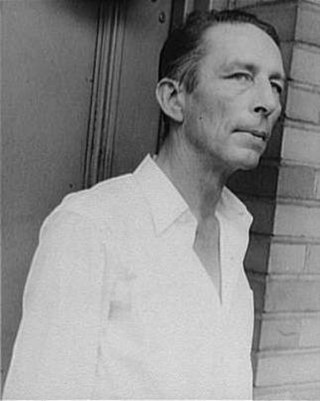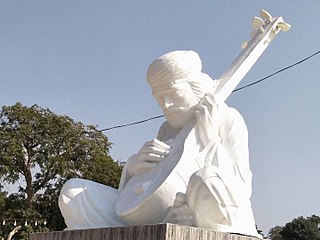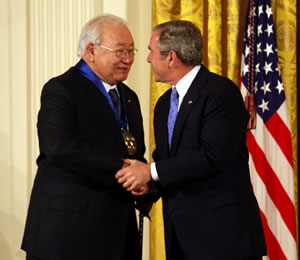Larry Robinson is an American poet.
Larry Robinson is an American poet.
Larry Robinson was born in Tiburon, California and came to Sonoma County, California in 1976. [1] He graduated from the University of California, Santa Cruz in 1969 [2] and earned his Masters in Marriage and Family Therapy from Sonoma State University [3]
Beginning in 1987, he worked as a psychotherapist for nearly 20 years and is now retired. He served on the Sebastopol, California City Council from 1998-2010, [4] including serving as Mayor from 2000-2001 and 2004-2005; during those periods, he was part of a Green Party majority on the City Council. [5]
Robinson founded the Rumi's Caravan event in 2000, an evening of poetry in the ecstatic tradition, which takes place annually, most recently at the Sebastopol Center for the Arts, Sebastopol, California. There is also a traveling troupe of poetry performers associated with the caravan. All of the performances raise money for nonprofit projects.
Robinson currently lives in Sebastopol, California. [6]
“For years, many of us have been enjoying the daily e-mail poems sent to us by Sebastopol poet Larry Robinson. Larry is a proponent of the oral tradition as well, hosting oral poetry salons and participating in the Rumi’s Caravan events. Now Larry has a new book: 'Roll Away the Stone', featuring 40 poems written over the past 20 years.” [7]

Jalāl al-Dīn Muḥammad Rūmī, or simply Rumi, was a 13th-century poet, Hanafi faqih, Islamic scholar, Maturidi theologian and Sufi mystic originally from Greater Khorasan in Greater Iran.

Poetry, also called verse, is a form of literature that uses aesthetic and often rhythmic qualities of language − such as phonaesthetics, sound symbolism, and metre − to evoke meanings in addition to, or in place of, a prosaic ostensible meaning. A poem is a literary composition, written by a poet, using this principle.

A poetry slam is a competitive art event in which poets perform spoken word poetry before a live audience and a panel of judges. While formats can vary, slams are often loud and lively, with audience participation, cheering and dramatic delivery.

Sebastopol is a city in Sonoma County, in California with a recorded population of 7,521, per the 2020 U.S. Census.

Johnny Otis was a first generation Greek-American singer, musician, composer, bandleader, record producer, and talent scout. He was a seminal influence on American R&B and rock and roll. He discovered numerous artists early in their careers who went on to become highly successful in their own right, including Little Esther Phillips, Etta James, Alan O'Day, Big Mama Thornton, Johnny Ace, Jackie Wilson, Little Willie John, Hank Ballard, and The Robins, among many others. Otis has been called the "Godfather of Rhythm and Blues".

Lawrence Monsanto Ferlinghetti was an American poet, painter, social activist, and co-founder of City Lights Booksellers & Publishers. An author of poetry, translations, fiction, theatre, art criticism, and film narration, Ferlinghetti was best known for his second collection of poems, A Coney Island of the Mind (1958), which has been translated into nine languages and sold over a million copies. When Ferlinghetti turned 100 in March 2019, the city of San Francisco turned his birthday, March 24, into "Lawrence Ferlinghetti Day".

David Mansfield Bromige was a Canadian-American poet who resided in northern California from 1962 onward. Bromige published thirty books, many so different from one another as to appear to be the work of a different author. Associated in his youth with the New American Poetry and especially with Robert Duncan and Robert Creeley, Bromige is sometimes associated with the language poets, but this connection is based more on his close friendships with some of those poets, and their admiration for his work. It is difficult to fit Bromige into a slot. He departs from language poetry in the thematic unity of many of his poems, in the uses to which he puts found materials, with the romantic aspect of his lyricism, and with the sheer variety of his approaches to the poem.

Persian literature comprises oral compositions and written texts in the Persian language and is one of the world's oldest literatures. It spans over two-and-a-half millennia. Its sources have been within Greater Iran including present-day Iran, Iraq, Afghanistan, the Caucasus, and Turkey, regions of Central Asia, South Asia and the Balkans where the Persian language has historically been either the native or official language. For example, Rumi, one of the best-loved Persian poets, born in Balkh or Wakhsh, wrote in Persian and lived in Konya, at that time the capital of the Seljuks in Anatolia. The Ghaznavids conquered large territories in Central and South Asia and adopted Persian as their court language. There is thus Persian literature from Iran, Mesopotamia, Azerbaijan, the wider Caucasus, Turkey, Pakistan, Bangladesh, India, Tajikistan and other parts of Central Asia, as well as the Balkans. Not all Persian literature is written in Persian, as some consider works written by ethnic Persians or Iranians in other languages, such as Greek and Arabic, to be included. At the same time, not all literature written in Persian is written by ethnic Persians or Iranians, as Turkic, Caucasian, Indic and Slavic poets and writers have also used the Persian language in the environment of Persianate cultures.

John Robinson Jeffers was an American poet known for his work about the central California coast.

Divan-i Kabir, also known as Divan-i Shams and Divan-i Shams-i Tabrizi, is a collection of poems written by the Persian poet and Sufi mystic Mawlānā Jalāl-ad-Dīn Muhammad Balkhī, also known as Rumi. A compilation of lyric poems written in the Persian language, it contains more than 40,000 verses and over 3,000 ghazals. While following the long tradition of Sufi poetry as well as the traditional metrical conventions of ghazals, the poems in the Divan showcase Rumi’s unique, trance-like poetic style. Written in the aftermath of the disappearance of Rumi’s beloved spiritual teacher, Shams-i Tabrizi, the Divan is dedicated to Shams and contains many verses praising him and lamenting his disappearance. Although not a didactic work, the Divan still explores deep philosophical themes, particularly those of love and longing.

Hossein Mohyeddin Ghomshei better known as Elahi Ghomshei, is an Iranian scholar, philosopher, author, and lecturer on literature, art, and mysticism.

Shah Abdul Latif Bhittai, commonly known by the honorifics Lakhino Latif, Latif Ghot, Bhittai, and Bhit Jo Shah, was a Sindhi Sufi mystic and poet from Pakistan, widely considered to be the greatest poet of the Sindhi language.

Coleman Barks is an American poet, and former literature faculty member at the University of Georgia. Although he neither speaks nor reads Persian, he is a popular interpreter of Rumi, rewriting the poems based on other English translations.

Sufi literature consists of works in various languages that express and advocate the ideas of Sufism.

William Craig Berkson was an American poet, critic, and teacher who was active in the art and literary worlds from his early twenties on.
Katherine Hastings is an American poet from Northern California. Her full length collections are “A Different Beauty”, "Shakespeare & Stein Walk Into a Bar", Nighthawks and Cloud Fire.

Navarre Scott Momaday is a Kiowa novelist, short story writer, essayist, and poet. His novel House Made of Dawn was awarded the Pulitzer Prize for Fiction in 1969, and is considered the first major work of the Native American Renaissance. His follow-up work The Way to Rainy Mountain blends folklore with memoir. Momaday received the National Medal of Arts in 2007 for his work's celebration and preservation of indigenous oral and art tradition. He holds 20 honorary degrees from colleges and universities and is a fellow of the American Academy of Arts and Sciences.
Douglas A. Powell is an American poet.

Afghan literature or literature of Afghanistan refers to the literature produced in the Islamic Emirate of Afghanistan. Influenced by Central and South Asian literature, it is predominantly written in two native and official languages of Afghanistan, Dari and Pashto. Some regional languages such as Uzbek, Turkmen, Balochi, and Pashayi also appears in Afghan literature. While Afghanistan is a multilingual country, these languages are generally used as oral compositions and written texts by the Afghan writers and in Afghan curriculum. Its literature is highly influenced by Persian and Arabic literature in addition to Central and South Asia.